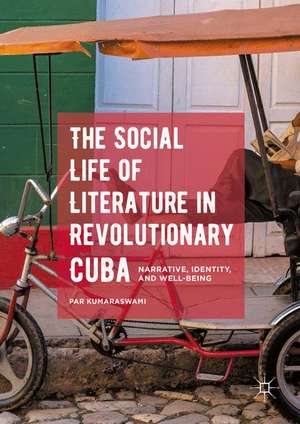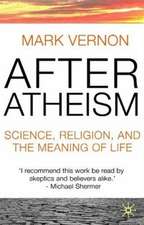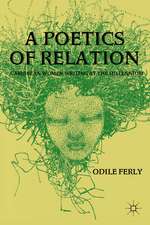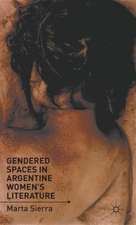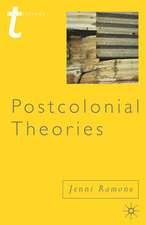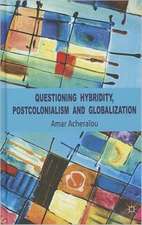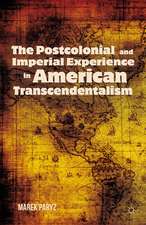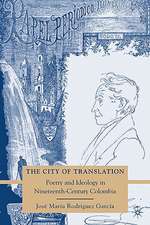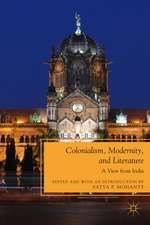The Social Life of Literature in Revolutionary Cuba: Narrative, Identity, and Well-being
Autor Par Kumaraswamien Limba Engleză Hardback – 21 aug 2016
| Toate formatele și edițiile | Preț | Express |
|---|---|---|
| Paperback (1) | 448.97 lei 6-8 săpt. | |
| Palgrave Macmillan US – 13 feb 2020 | 448.97 lei 6-8 săpt. | |
| Hardback (1) | 583.45 lei 6-8 săpt. | |
| Palgrave Macmillan US – 21 aug 2016 | 583.45 lei 6-8 săpt. |
Preț: 583.45 lei
Preț vechi: 686.42 lei
-15% Nou
Puncte Express: 875
Preț estimativ în valută:
111.64€ • 116.57$ • 92.19£
111.64€ • 116.57$ • 92.19£
Carte tipărită la comandă
Livrare economică 15-29 aprilie
Preluare comenzi: 021 569.72.76
Specificații
ISBN-13: 9781137569639
ISBN-10: 1137569638
Pagini: 232
Ilustrații: IX, 222 p.
Dimensiuni: 148 x 210 x 21 mm
Greutate: 0.4 kg
Ediția:1st ed. 2016
Editura: Palgrave Macmillan US
Colecția Palgrave Macmillan
Locul publicării:New York, United States
ISBN-10: 1137569638
Pagini: 232
Ilustrații: IX, 222 p.
Dimensiuni: 148 x 210 x 21 mm
Greutate: 0.4 kg
Ediția:1st ed. 2016
Editura: Palgrave Macmillan US
Colecția Palgrave Macmillan
Locul publicării:New York, United States
Cuprins
Introduction The social life of literature in contemporary Cuba: Negotiating identity, attaining well-being, surviving social change.-.Chapter One Culture, identity and well-being: Reviewing the possibilities.-.Chapter 2 Social change, cultural policy and the functions of literature: Understanding culture and revolution in Cuba, 1959-1989.-.Chapter 3 “La cultura es lo primero que hay que salvar”: Writers, literature and well-being in the Período Especial, 1990-2000.-.Chapter 4 “La cosa esta que vino después”: Reading testimonial literature, well-being and narrative during the Batalla de Ideas, 2000-2007.-.Chapter 5 Subjective well-being and culture as everyday practice in contemporary Cuba, 2007-2012.-.Conclusion The promise of well-being through culture in contemporary Cuba: Morality, culture and the market.
Recenzii
“The Social Life of Literature in Revolutionary Cuba provides a noteworthy discussion of recent Cuban cultural production and everyday life. Responding to economic, political and social changes, Cuban culture at this time acutely highlights the relationship between social well-being and cultural participation. Kumaraswami’s book will be of value to scholars seeking a timely interdisciplinary analysis of Cuban culture during the first two decades of the twenty-first century.” (Erin s. Finzer, Bulletin of Spanish Studies, Vol. 98 (07), 2018)
Notă biografică
Par Kumaraswami is Associate Professor in Latin American Cultural Studies at the University of Reading, UK. She has published extensively on Cuban cultural policy and practice, including her monograph Literary Culture in Cuba: Revolution, Nation-building and the Book (2012), co-authored with Antoni Kapcia.
Textul de pe ultima copertă
This study explores the social functions of literature from the perspective of policymakers, writers, readers and residents in contemporary Cuba. It provides a new perspective on post-59 Cuban literature that underlines how cultural policy has made literature a hybrid activity between elite and mass culture, with inherent social, rather than aesthetic or political, value. Whilst many traditional studies of Cuban literature assume either its subjugation to politics and ideology or, conversely, its role in resisting political discourse via a rather naïve notion of artistic freedom, this project explores the varied, dynamic and multiple ways in which literature works in Cuban society: as a catalyst for identity construction aimed at consensus and belonging, but also as an instrument of self-differentiation and self-definition, even in the more recent context of a more market-oriented system. The study reviews policy from 1959 to the present, and presents contemporary casestudies exploring the social functions of literature for writers, readers and ordinary Havana residents.
Caracteristici
Takes a new approach to the understanding of literature in revolutionary Cuba that goes beyond the usual art vs politics vs market paradigms Utilizes methods not usually used in literary or cultural studies to examine literature as an everyday mass activity, in terms of its social functions Based on sustained and in-depth fieldwork over nearly a decade
